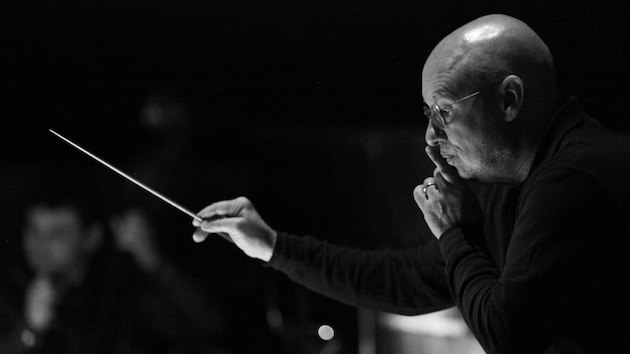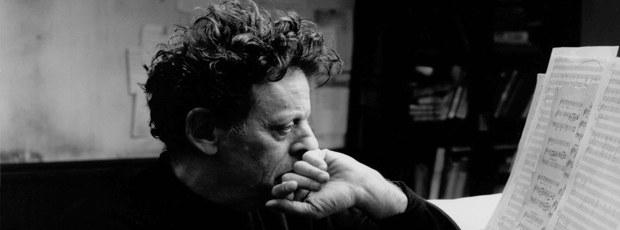
Touring orchestras tend to play it safe with their repertory. But that’s hardly the case with Bruckner Orchestra Linz, which is finishing up its American tour with a series of concerts in Northern California, Feb. 10–11 at the Mondavi Center, Feb. 12 at Stanford Live. Music Director Dennis Russell Davies, a frequent collaborator of Philip Glass, is leading the ensemble in the world premiere of the composer’s 11th symphony. The orchestra commissioned the work in honor of Glass’ 80th birthday.
After alighting in New York, where the tour began, Davies — a native of Toledo, Ohio, who has spent most of his career in Europe — spoke about his long relationship with Glass, and the work involved in preparing a major new work for its first performances.
Last week in The New York Times, Philip Glass said, “The best thing for me is when I play a new piece, and someone says, ‘Oh, it doesn’t sound like you.’ That to me is a success.” Does the 11th Symphony sound like Glass to you?
Of course it does. Philip’s music is very recognizable. It’s a very dramatic, very interesting piece. It’s a three-movement work. The eighth and ninth symphonies ended introspectively and reflectively. The 10th and 11th symphonies both have loud, festive, flamboyant endings.
Does he just hand you a new work and say, “Here it is”? Or does he want your input?
In 2001, when I began working in Linz, the Bruckner Orchestra and Carnegie Hall commissioned his sixth symphony. Since that time, (when I conduct a new piece of his), Philip has always given me a manuscript, usually a movement at a time. I read it, and ask him a lot of questions. Why this? Why that?
If I see mistakes, I point them out to him. If I have suggestions, I tell him. We have a relationship based on a trust. I have a lot of confidence in his musical instincts; he has a lot of confidence in my judgment. So the relationship works pretty well. There’s not a lot of ego involved.

What kind of suggestion might you make?
Sometimes it’s structural. Sometimes it’s orchestration. Sometimes I don’t quite understand what he’s getting at. I point it out to him, he looks at it, and gives me an answer. He makes a lot of changes. For the 11th symphony, he came to Linz 2 ½ weeks ago, and we rehearsed the piece. He decided it needed a new ending, so he spent five days rewriting it. It was his idea.
Did you agree with him?
Sure. He’s the composer.
Is that kind of collaboration typical of the composers you work with?
I have had that experience. I remember when I premiered Lou Harrison’s Third Symphony in Cabrillo. It’s a wonderful piece. At the first rehearsal, the fourth movement was difficult. I wanted more time to rehearse. But Lou thought, “This shouldn’t be that difficult.” So he went home and rewrote the whole thing. Remember, Beethoven wrote the Leonore Overture three times. There are three versions of Bruckner’s Third Symphony. This is not unusual.
Do you see any connections between Bruckner’s music and Glass’?
A great deal. I’ve done a lot of concerts with both of their music on the program. They work very well together. There’s a sense of space and time in both of them that is very similar. They have elements in the melodic and rhythmic structure that are very similar.
When did you meet Philip Glass?
1978. I had done one piece of his with Pierre Boulez’s Ensemble InterContemporain. A couple of years later, he visited me with the score of his second opera, Satyagraha. I couldn’t do the premiere, but I was so impressed with the piece that I offered him a second production, in Stuttgart. That was the beginning of our collaboration.
I have read that you are the person who convinced Glass to write symphonies. Is that overstated?
I conducted many of his early operas, and I realized (through that experience) that he had a gift for writing for orchestra. I said to him, “Don’t be like Verdi and just write operas. Write orchestral music, too.” This was in the late ’80s or early ’90s.
Tell me about the orchestra, which isn’t that well known in the U.S. I’m guessing it has a long history.

It has been the state orchestra of upper Austria for more than 200 years. It is celebrating 50 years as the Bruckner Orchestra this year. We perform for the opera, and have concert series in Linz and Vienna. We also perform regularly in St. Florian, which is the cathedral just outside Linz where Bruckner lived, performed, and was later buried.
Did you find it intimidating to play his music in that space, where he is, in a sense, hanging around?
I don’t know if it was intimidating, but it was certainly inspiring. When you perform in that space, you learn a lot about how to perform his music.
There are abrupt stops to the music, and fermatas [markings indicating that a note should be prolonged] that come in the middle of a movement. When you play it in the acoustic of that cathedral, you realize he inserted them because the space [demands it.] It also has a big effect on the tempos that you choose. It’s all about how you can make the music understandable in the space for which it was written.
And this gives you understanding that you take to performance in other halls, and on recordings?
Of course.
You are touring with Robert McDuffie, who is playing the violin concertos of Glass and Samuel Barber. What do you like about his playing?
He’s obsessive about music. He takes a piece by the throat and lays it bare for the public. He loves the pieces he’s playing, and communicates that to the audience.
Barber is a great composer, but not one whose music is programmed all that often by American orchestras. Why is that?
I’m glad you’re asking the question. More people should. A lot of his works deserve to be played more regularly. When I was younger, his piano sonata and piano concerto were both regularly programmed. It’s a shame our major orchestras don’t play this music.
How long do you plan to remain with the Linz orchestra?
This is my 15th and final season. It’s a good time to step back a little bit. I’m looking forward to doing some guest conducting. My wife, Maki Namekawa, is a wonderful pianist. We have a piano duo, and I’m looking forward to doing more with her.
Immediately after our tour, she and I will be at the Other Minds Festival in San Francisco. We’ll be celebrating [the music of] Lou Harrison and Isang Yun, who would both be 100 this year. I knew both of them very well, and was very close to Lou Harrison. So it’s very important for me to participate in this.
Bruckner Orchestra Linz, conducted by Dennis Russell Davies, performs at 8 p.m. Friday Feb. 10 and Saturday Feb. 11 at the Mondavi Center at UC Davis. Friday’s concert features Philip Glass’ Violin Concerto and Symphony No. 11. Saturday’s includes Schumann’s First Symphony and Barber’s Violin Concerto. Ticket information: 530-754-2787 or [email protected].
It will also perform at 4 p.m. Sunday Feb. 12 in the Bing Concert Hall at Stanford University. The program features Glass’ Symphony No. 11 and Barber’s Violin Concerto. Ticket information: 650.724.BING (2464) or http://www.stanfordlivetickets.org.
Davies will also conduct and play the piano at 7:30 p.m. February 18 at Mission Dolores Basilica in San Francisco, as part of Other Minds Festival 22. Information: http://www.otherminds.org.

